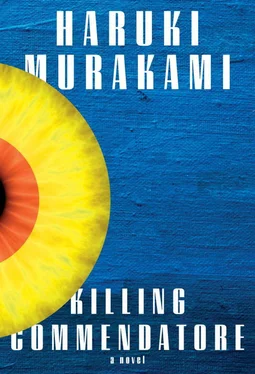Menshiki explained that on the floor below where we were currently seated, there was a storehouse, a laundry room, and a gym. The gym was outfitted with all sorts of workout equipment. It had a sound system so he could enjoy music while he exercised. Once a week a trainer came and led him through strength-training exercises. There was also an efficiency-sized residence for a live-in maid. It had a simple kitchen and small bathroom, though nobody was using it at present. There used to be a small indoor pool, but it wasn’t very practical and took a lot of upkeep, so he had had it filled in and made into a greenhouse. Someday he might build a two-lane twenty-five-meter lap pool, he said. If I do, he said, I’d love for you to come over and swim. That would be wonderful, I said.
We headed to the dining room.
24
MERELY GATHERING RAW DATA
The dining room was on the same floor as the study. The kitchen was in back of it. The dining room was a long room, with a large, long table in the middle. The oak table was about four inches thick, and big enough for ten people. A solid table that would look good hosting a banquet for Robin Hood and his men. But it was simply the two of us, Menshiki and myself, not a merry band of outlaws. A place was set for the Commendatore, but he wasn’t there. A place mat, silverware, and an empty glass were ready for him, but they were just for show. A courtesy to indicate that was his place.
Like in the living room, one long wall was entirely glass. It looked out over the mountain range beyond the valley. Just as I could see Menshiki’s house from mine, my house should be visible from his. The house I lived in, though, was nowhere as big as Menshiki’s mansion, and it was a wooden building whose subdued color didn’t stand out, so in the dark I couldn’t make out where it was. There weren’t many homes built here, but in each of the houses that dotted the mountains there were clearly lights on inside. It was dinnertime. People were with their families at the dinner table, about to enjoy a hot meal. I could sense that slight warmth in those lights.
In contrast, on the other side of the valley, Menshiki, I, and the Commendatore were seated at that large table, about to begin an eccentric, formal dinner party. Outside a fine rain continued to silently fall. But there was almost no wind, and it was a typically hushed autumn night. I looked out the window and thought again about the hole. About the lonely stone-lined chamber behind the little shrine. Even as we sat here the hole was there, dark and dank. Memories of that scene brought a special chill to me, deep inside.
“I found this table while traveling in Italy,” Menshiki said after I’d complimented it. He didn’t sound like he was bragging, simply stating facts. “I ran across it in a furniture store in Lucca, purchased it, and had it shipped here. It’s so heavy it was quite a task to transport it.”
“Do you go abroad very often?”
His lips twisted up a bit, then relaxed. “I used to. Part business, part pleasure. Not so many opportunities to do so these days. I’m doing a different sort of work now. Plus I no longer like to go out much anymore. Most of the time I’m here.”
To indicate more clearly what he meant by “here,” he motioned toward the house with his hand. I expected him to add more about this change in his work, but that’s all he said. As always, he didn’t seem eager to say much about his work, and I didn’t press him about it.
“I thought we’d start with some well-chilled champagne, if that’s all right with you. You don’t mind?”
“Of course not,” I said. “I’ll leave it all up to you.”
Menshiki made a faint motion, and the ponytailed young man came over and poured cold champagne into long narrow flutes. Pleasant little bubbles fizzed up in the glasses, so light and thin they seemed made of high-quality paper. We toasted each other across the table. Then Menshiki respectfully lifted his glass to the unoccupied seat for the Commendatore.
“Thank you so much for coming, Commendatore,” he said.
There was, naturally, no reply from the Commendatore.
As he enjoyed the champagne, Menshiki talked about opera. About how, on a trip to Sicily, he saw a spectacular performance of Verdi’s Ernani at the Catania opera house. The person seated next to him sang along with the performers, all the while snacking on mandarin oranges. And how he’d had some amazing champagne there.
The Commendatore finally made an appearance in the dining room, though not at the seat at the table prepared for him. Given his short stature, he would have only come up to nose level, hidden by the table. Instead he plunked himself down on a kind of display shelf diagonally behind Menshiki. He was about five feet off the floor, lightly swinging his feet clad in those oddly shaped black shoes. I raised my glass slightly to him so that Menshiki wouldn’t see. As expected, the Commendatore acted as if he didn’t notice.
The meal was served at this point. There was an open serving slot between the kitchen and the dining room and the bow-tied, ponytailed young man brought each dish placed there one by one to our table. For a first course, we had a beautiful dish of organic vegetables and fresh isaki fish. Accompanied by white wine. The ponytailed young man uncorked the bottle as carefully as if he were an explosives expert handling a land mine. No explanation of what kind of wine it was or where it was from, though of course it was superb. Menshiki wasn’t about to serve a less-than-perfect wine.
After that we were served a salad of lotus root, calamari, and white beans. Then a sea turtle soup. The fish dish was monkfish.
“It’s a bit early in the season for it, but I heard that down at the harbor they got hold of some excellent monkfish,” Menshiki said. The fish was certainly fresh and amazing. Firm texture, a refined sweetness, but still a clean aftertaste. Lightly steamed, then served with (what I took to be) a tarragon sauce.
Next came thick venison steaks. There was again an explanation of the special sauce, but it was so full of specialized terms I couldn’t remember half of it. At any rate, a wonderfully fragrant sauce.
The ponytailed young man poured red wine into our glasses. Menshiki explained that the bottle had been opened an hour before and decanted.
“It’s breathed nicely, and it should be just the peak time to drink it.”
I knew nothing about aerating wine, but it had a deep flavor. When your tongue first encountered it, then when you held it in your mouth, and finally when you drank it down, the flavor was different each time. It was like a mysterious woman whose beauty changes slightly depending on the angle and light. The wine left a pleasant aftertaste.
“It’s Bordeaux,” Menshiki said. “I won’t sing its praises. Just know it’s a Bordeaux.”
“It’s the kind of wine that once you started listing its good points, you’d have a long list.”
Menshiki smiled. Pleasant wrinkles formed at the corners of his eyes. “You’re exactly right. It would be very long if you listed its merits. But I don’t particularly like to do that with wines. I’m not good at enumerating the merits of things, no matter what they are. It’s just a delicious wine—that’s enough, right?”
I had no objections to that.
All this time the Commendatore watched us drinking and eating from his perch on the display shelf. He sat there, unmoving, diligently observing the scene there down to the smallest detail, but didn’t seem to have any reaction to what he was seeing. Like he told me once, he merely observes. He doesn’t judge, or have any partiality toward it. He’s merely gathering raw data.
This might be how he observed me and my girlfriend making love in bed in the afternoons. The thought unsettled me. He’d told me that watching people have sex was for him no different from watching morning radio exercise routines or someone sweeping a chimney. And that might very well be the case. But the fact remained that it was disconcerting to think of being observed.
Читать дальше











